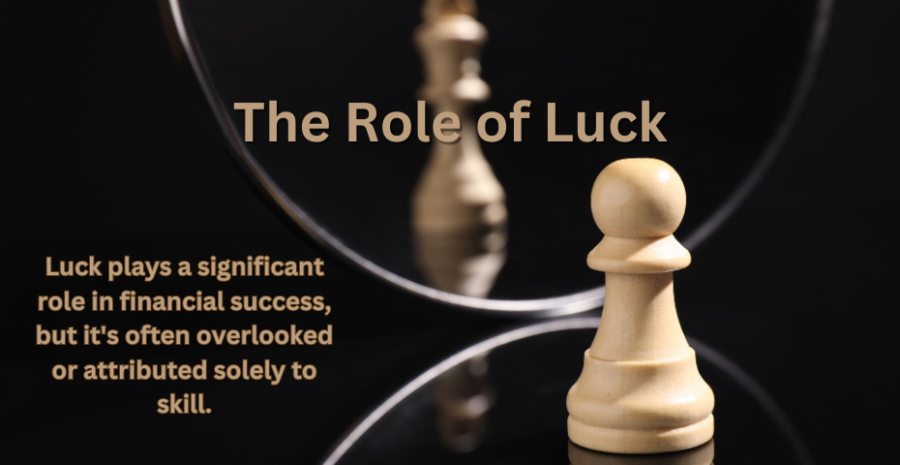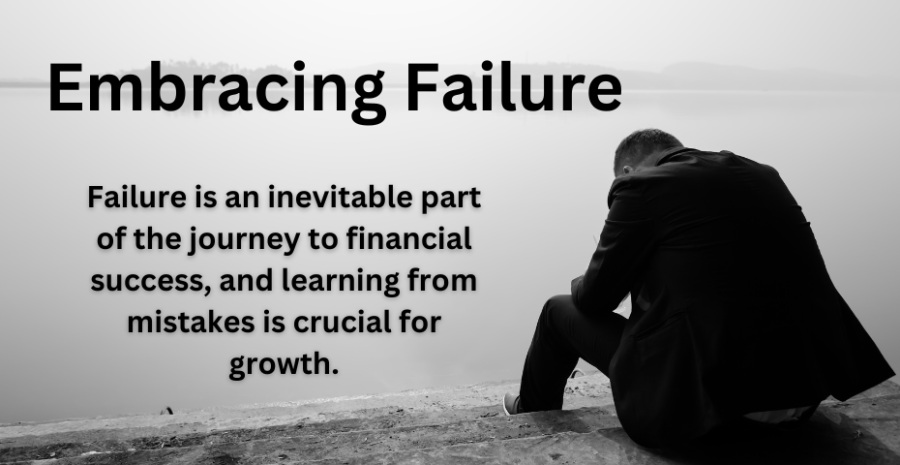
Unlocking Wealth: Exploring the Psychology of Money.
.png)
Unlocking Wealth:
Exploring the Psychology of Money" delves deep into the intricate relationship between our minds and our financial well-being. In this insightful exploration, we embark on a journey to understand the hidden forces that shape our attitudes, behaviors, and decisions regarding money. From the subconscious biases that influence our investment choices to the psychological traps that hinder wealth accumulation, this blog offers a comprehensive examination of the complex interplay between psychology and finance.
Through compelling anecdotes, rigorous research, and practical advice, we uncover the keys to unlocking true wealth beyond mere monetary assets. By illuminating the often-overlooked psychological underpinnings of financial success, this blog empowers readers to navigate the ever-changing landscape of personal finance with clarity and confidence.
Whether you're a seasoned investor or just beginning your financial journey, "Unlocking Wealth" equips you with the insights and strategies needed to achieve your financial goals and secure your financial future. Prepare to embark on a transformative exploration that will revolutionize the way you think about money and unleash your full potential for prosperity.
The Psychology of Money is a compelling exploration of how people think about and interact with money. Here's a breakdown of 20 key lessons in this blog:
1. Understanding Wealth:
True wealth is not just about money but about having options and control over one's life. Understanding wealth goes beyond the mere accumulation of money; it encompasses the ability to leverage resources effectively to achieve one's goals and aspirations. It involves cultivating a mindset of abundance and recognizing the value of intangible assets such as time, relationships, and personal fulfillment.
True wealth lies in having the freedom and autonomy to live life on one's own terms, unconstrained by financial limitations. It is a dynamic and multifaceted concept that evolves with individual priorities and values. By understanding wealth in its broader context, we can make more informed decisions that prioritize long-term fulfillment over short-term gains.
Ultimately, wealth is not just about what we have but about who we are and how we choose to live our lives. Embracing this holistic understanding empowers us to pursue a path of true prosperity and fulfillment.
2. The Power of Compounding:
.png)
Small, consistent actions over time can lead to significant wealth accumulation due to the power of compounding. The power of compounding is often described as the eighth wonder of the world, as it has the remarkable ability to turn small actions into significant results over time. At its core, compounding is the process of generating earnings on both the initial investment and the accumulated returns.
This exponential growth curve underscores the importance of starting early and being consistent in our financial habits. Even small, regular contributions can snowball into substantial wealth over the long term. By harnessing the power of compounding, individuals can achieve their financial goals with less effort and risk than they might initially anticipate.
Understanding this principle is key to making informed decisions about saving, investing, and planning for the future. Embracing the power of compounding empowers individuals to take control of their financial destiny and build a solid foundation for lasting prosperity.
3. Time Horizon:
The longer your time horizon, the more important your investment decisions become, as small differences in returns compound over time. The time horizon is a critical factor in financial planning, representing the length of time an individual expects to hold an investment or achieve a financial goal. Shorter time horizons typically necessitate more conservative investment strategies to mitigate the impact of market volatility.
Conversely, longer time horizons afford investors the opportunity to pursue potentially higher-risk, higher-reward investments, taking advantage of the power of compounding. Understanding one's time horizon allows for the alignment of investment strategies with specific goals, whether they be short-term, such as buying a house, or long-term, like retirement planning. Additionally, the time horizon influences asset allocation decisions, guiding investors towards a diversified portfolio tailored to their unique needs and circumstances.
By carefully considering their time horizon, investors can optimize their investment approach to maximize returns while minimizing unnecessary risk. Moreover, regularly revisiting and adjusting the time horizon in response to life events or changing financial objectives is crucial for maintaining a resilient and adaptable financial plan.
4. Risk and Uncertainty:

Risk and uncertainty are not the same; understanding the difference is crucial for making informed financial decisions. Risk and uncertainty are inherent aspects of investing, but they are often misunderstood or conflated. Risk refers to the probability of loss or deviation from expected returns, while uncertainty pertains to the lack of predictability or information about future outcomes.
Recognizing the distinction between the two is essential for crafting a well-balanced investment strategy that accounts for both known risks and unforeseeable events. Effective risk management involves diversification, asset allocation, and periodic reassessment of one's tolerance for risk in light of changing market conditions and personal circumstances.
Embracing uncertainty as an inevitable part of the investment process allows investors to adopt a more flexible and resilient mindset, enabling them to navigate market fluctuations and capitalize on opportunities as they arise. Ultimately, the key to successful investing lies in finding the right balance between risk and uncertainty, optimizing returns while safeguarding against potential losses.
5. Behavioral Biases:
Recognizing and mitigating behavioral biases, such as overconfidence and loss aversion, is essential for successful investing. Behavioral biases are inherent tendencies that influence our decision-making processes, often leading to irrational or suboptimal choices, particularly in the realm of finance. Common biases include overconfidence, confirmation bias, and loss aversion, which can distort our perceptions and judgments about investments.
Recognizing these biases is the first step toward mitigating their impact and making more rational financial decisions. Strategies such as diversification, setting clear investment objectives, and seeking feedback from trusted advisors can help counteract the effects of behavioral biases.
Additionally, cultivating mindfulness and emotional awareness can help investors remain disciplined and objective during periods of market volatility or uncertainty. By understanding and actively managing their behavioral biases, investors can enhance their ability to achieve their long-term financial goals and navigate the complexities of the investment landscape more effectively.
6. The Role of Luck:

Luck plays a significant role in financial success, but it's often overlooked or attributed solely to skill. The role of luck in financial success is often underestimated or overlooked, yet it can play a significant and unpredictable part in investment outcomes.
While skill and diligence are crucial, luck can tip the scales in favor of or against an investor, particularly in the short term. Recognizing the influence of luck encourages humility and a realistic perspective on one's achievements and setbacks. It also underscores the importance of diversification and risk management as strategies to mitigate the impact of unpredictable events. Moreover, acknowledging the role of luck fosters empathy and understanding toward others, as not everyone has the same opportunities or experiences the same level of fortune.
Despite its unpredictability, luck can serve as a reminder of the need for resilience, adaptability, and gratitude in the face of uncertainty. Embracing the role of luck with humility and grace allows investors to navigate the ups and downs of the market with equanimity and resilience.
7. Adaptability:
Flexibility and adaptability are essential traits for navigating the unpredictable nature of financial markets and life in general. Adaptability is a cornerstone of successful investing, enabling individuals to respond effectively to changing market conditions and evolving economic landscapes. Those who demonstrate adaptability are more likely to thrive in dynamic environments, seizing opportunities and mitigating risks as they arise.
Embracing adaptability requires a willingness to learn, unlearn, and relearn in response to new information and circumstances. Flexibility in investment strategies and the ability to pivot when necessary are essential traits for navigating uncertainty and volatility. Moreover, adaptability fosters innovation and resilience, empowering investors to overcome challenges and capitalize on emerging trends.
By cultivating a mindset of adaptability, investors can position themselves to thrive in both bull and bear markets, achieving long-term financial success regardless of the prevailing conditions. Ultimately, adaptability is not just a skill but a mindset—a commitment to continuous growth and improvement in pursuit of financial goals.
8. The Power of Stories:

Narratives shape our understanding of money and investing, but they can also lead to irrational decision-making.The power of stories lies in their ability to shape our perceptions, beliefs, and behaviors, often exerting a profound influence on our decisions regarding money and investing.
Narratives surrounding wealth, success, and financial independence can evoke strong emotions and motivations, driving individuals to pursue certain paths or strategies. However, stories can also perpetuate myths or misconceptions about money, leading to irrational decision-making or unrealistic expectations. By critically evaluating the stories we tell ourselves and others about money, we can gain insight into our financial motivations and biases.
Moreover, harnessing the power of stories can be a powerful tool for financial education and empowerment, offering relatable and memorable lessons about money management and wealth creation. Ultimately, understanding the impact of stories on our financial lives empowers us to craft narratives that align with our values, goals, and aspirations, fostering a healthier and more holistic relationship with money.
9. Simple Beats Complex:
Simple, timeless investment strategies often outperform complex ones, as they are easier to stick with and less prone to failure. In the realm of investing, simplicity often triumphs over complexity, as straightforward strategies tend to be more sustainable and easier to execute. Complex investment products or strategies may promise higher returns, but they often come with higher fees, increased risk, and greater potential for confusion.
Simple, time-tested approaches, such as index fund investing or dollar-cost averaging, can outperform complex strategies over the long term while requiring less time and effort to manage. Moreover, simplicity fosters clarity and confidence, enabling investors to stay the course during periods of market volatility or uncertainty.
By focusing on the fundamentals and avoiding unnecessary complexity, investors can build robust and resilient portfolios that withstand the test of time. Ultimately, simplicity is not just a matter of convenience; it's a strategic advantage that enhances the likelihood of achieving long-term financial goals.
10. Know Yourself:
.png)
Self-awareness is critical for making financial decisions aligned with your values, goals, and risk tolerance. Knowing yourself is foundational to successful financial decision-making, as it allows you to align your financial strategies with your values, goals, and risk tolerance.
Understanding your motivations, biases, and behavioral tendencies enables you to make more informed choices that are in line with your long-term objectives. By recognizing your strengths and weaknesses, you can capitalize on your advantages while mitigating potential pitfalls. Moreover, self-awareness fosters resilience and adaptability, empowering you to navigate challenges and setbacks with confidence and grace.
Regular self-reflection and introspection are essential for cultivating a deeper understanding of your financial beliefs and attitudes. Embracing your unique financial personality and preferences enables you to craft a customized approach to money management that resonates with who you are. Ultimately, knowing yourself is the first step toward building a solid foundation for financial success and fulfillment.
11. Avoiding Extremes:
Extreme wealth or poverty often result from extreme behaviors; moderation and balance are key. Avoiding extremes in financial decision-making is paramount for maintaining stability and achieving long-term success. Extreme behaviors, such as excessive risk-taking or extreme frugality, can lead to unnecessary stress, volatility, and ultimately, financial hardship.
Striking a balance between saving and spending, investing and diversifying, and risk-taking and risk management is crucial for sustainable wealth accumulation. Additionally, extreme attitudes toward money can strain relationships and diminish overall well-being. By embracing moderation and balance, individuals can enjoy the benefits of financial security without sacrificing quality of life or compromising their values.
Avoiding extremes allows for greater flexibility and adaptability, enabling individuals to navigate life's inevitable uncertainties with resilience and grace. Ultimately, moderation is the key to sustainable financial health and happiness.
12. Leverage and Debt:

While leverage can amplify returns, it also increases risk and can lead to financial ruin if not managed carefully. Leverage and debt can be powerful tools for wealth creation when used wisely, but they also come with inherent risks that must be carefully managed.
While leverage can amplify returns and accelerate wealth accumulation, it also magnifies losses and increases financial vulnerability during market downturns. Understanding the difference between good debt, which can enhance long-term wealth-building opportunities, and bad debt, which can lead to financial distress, is essential for making informed borrowing decisions. Prudent debt management involves maintaining a manageable debt-to-income ratio, prioritizing high-interest debt repayment, and avoiding excessive borrowing beyond one's means.
Moreover, leveraging assets as collateral for loans introduces additional risks, as asset values can fluctuate over time. By exercising caution and discipline, individuals can harness the benefits of leverage and debt while minimizing their potential downsides, ultimately optimizing their financial outcomes in the long run.
13. The Cost of Financial Illiteracy:
Ignorance about personal finance can have severe consequences, highlighting the importance of financial education. The cost of financial illiteracy extends far beyond monetary losses; it encompasses missed opportunities, increased stress, and diminished quality of life. Ignorance about personal finance subjects individuals to higher fees, interest rates, and taxes, eroding their wealth over time.
Moreover, financial illiteracy can lead to poor decision-making, such as overspending, undersaving, or falling victim to scams and predatory financial products. The consequences of financial illiteracy ripple throughout society, affecting individuals, families, and communities alike. By investing in financial education and literacy programs, society can empower individuals to make informed decisions, improve their financial well-being, and contribute to economic growth and stability.
Ultimately, the true cost of financial illiteracy is incalculable, underscoring the urgent need for comprehensive financial education initiatives at all levels.
14. Delayed Gratification:

The ability to delay gratification is a hallmark of financial success, as it allows for long-term planning and goal achievement. Delayed gratification is a fundamental principle of financial success, requiring individuals to resist immediate rewards in favor of long-term benefits. By postponing consumption and saving or investing instead, individuals can build wealth and achieve their financial goals over time.
Cultivating the ability to delay gratification fosters discipline, patience, and self-control, essential qualities for navigating the ups and downs of the financial journey. Moreover, delaying gratification enables individuals to prioritize their needs and goals, distinguishing between wants and needs and making intentional choices that align with their values.
While delayed gratification may require short-term sacrifices, the rewards of financial security, freedom, and fulfillment are well worth the wait. Embracing delayed gratification as a guiding principle empowers individuals to take charge of their financial future and reap the rewards of disciplined decision-making over time.
15. The Value of Time:
Time is one of the most valuable assets we have, and how we choose to spend it has profound implications for our financial well-being. The value of time in financial planning cannot be overstated, as time is a crucial factor in the power of compounding and long-term wealth accumulation. Starting early allows individuals to take advantage of the exponential growth potential of investments over time.
Additionally, time provides a buffer against market fluctuations, allowing investments to weather short-term volatility and generate higher returns in the long run. Each moment presents an opportunity to make progress toward financial goals, emphasizing the importance of using time wisely and making proactive financial decisions. Moreover, time spent wisely in pursuit of personal and professional development can enhance earning potential and open doors to new opportunities.
Recognizing the finite nature of time encourages individuals to prioritize their financial objectives and make the most of every opportunity for growth and enrichment. Ultimately, understanding and appreciating the value of time empowers individuals to make strategic choices that maximize their financial well-being and overall quality of life.
16. Investing in Yourself:

Continuous learning and personal development are invaluable investments that can yield high returns throughout life.Investing in yourself is one of the most valuable decisions you can make, with returns that extend far beyond financial gains. By prioritizing personal and professional development, you enhance your skills, knowledge, and abilities, positioning yourself for greater success and fulfillment in all aspects of life.
Whether through formal education, skill-building workshops, or self-directed learning, investing in yourself cultivates a growth mindset and opens doors to new opportunities. Moreover, investing in your physical and mental well-being through exercise, self-care, and mindfulness practices improves resilience, energy levels, and overall quality of life.
The benefits of self-investment compound over time, leading to increased confidence, self-awareness, and adaptability in the face of challenges. Ultimately, the greatest asset you possess is yourself, and dedicating time and resources to personal growth is an investment with infinite potential for positive returns. By prioritizing self-investment, you lay the foundation for a fulfilling and prosperous future, both personally and professionally.
17. Diversification:
Diversifying investments across different asset classes reduces risk and increases the likelihood of achieving long-term financial goals. By spreading investments across various sectors, industries, and geographic regions, diversification helps reduce the impact of market volatility on a portfolio. Moreover, diversification minimizes the risk of catastrophic losses associated with overexposure to any single investment or market sector.
While diversification does not guarantee against loss, it is an essential strategy for preserving capital and achieving more consistent returns over the long term. Additionally, diversification allows investors to capture opportunities for growth in different market environments, enhancing the overall stability and resilience of their investment portfolios.
Embracing diversification as a guiding principle empowers investors to build robust and balanced portfolios that can weather the ups and downs of the market with confidence. Ultimately, diversification is a cornerstone of prudent investing, offering protection against unforeseen risks while maximizing the potential for long-term wealth accumulation.
18. Embracing Failure:

Failure is an inevitable part of the journey to financial success, and learning from mistakes is crucial for growth. Embracing failure is a transformative mindset that fosters resilience, growth, and innovation in the realm of finance and beyond. Rather than viewing failure as a setback, it is an opportunity to learn valuable lessons, refine strategies, and adapt to changing circumstances.
Embracing failure requires humility, courage, and a willingness to confront challenges head-on, recognizing that setbacks are an inevitable part of the journey to success. By reframing failure as a stepping stone to progress, individuals can overcome fear of failure and take calculated risks that lead to greater rewards. Moreover, embracing failure cultivates a growth mindset, enabling individuals to persevere in the face of adversity and continually strive for improvement.
Learning from failure also strengthens decision-making skills, as it provides valuable feedback on what works and what doesn't. Ultimately, those who embrace failure as an integral part of the learning process are better equipped to navigate uncertainty, seize opportunities, and achieve their financial goals with confidence.
19. The Importance of Relationships:
Building strong personal and professional relationships can open doors to opportunities and provide invaluable support during challenging times. The importance of relationships in financial success cannot be overstated, as strong personal and professional connections can open doors to opportunities and provide invaluable support during challenging times.
Cultivating meaningful relationships with mentors, colleagues, and industry peers fosters collaboration, knowledge-sharing, and networking, which can accelerate career advancement and business growth. Moreover, strong personal relationships with family and friends provide emotional support and encouragement, helping individuals navigate financial decisions with confidence and peace of mind.
Building trust and rapport with financial advisors, bankers, and other professionals is essential for receiving sound advice and guidance tailored to one's unique needs and circumstances. Additionally, investing time and effort in maintaining positive relationships fosters a sense of community and belonging, enriching both personal and professional lives. Ultimately, the quality of our relationships often determines our success and fulfillment in life, highlighting the profound impact of human connections on our financial well-being.
20. Gratitude and Perspective:

Cultivating gratitude and maintaining perspective on what truly matters in life can lead to greater financial contentment and overall well-being. Gratitude and perspective are powerful antidotes to the pitfalls of financial stress and discontent, reminding us to appreciate the abundance in our lives and focus on what truly matters. By cultivating gratitude, we shift our attention away from scarcity and toward abundance, fostering a positive mindset that attracts more opportunities for growth and prosperity.
Moreover, gratitude strengthens our relationships and social connections, as expressing appreciation for others fosters deeper bonds and mutual support. Maintaining perspective allows us to see beyond temporary setbacks or challenges, recognizing the broader context of our financial journey and the progress we've made.
Embracing gratitude and perspective instills resilience and optimism, enabling us to weather financial ups and downs with grace and resilience. Ultimately, gratitude and perspective are not just attitudes but practices that enhance our overall well-being and fulfillment, empowering us to live more meaningful and satisfying lives, regardless of our financial circumstances.
These lessons underscore the complex interplay between psychology and finance and offer valuable insights for anyone seeking to better understand and navigate their relationship with money.
In conclusion:
"Unlocking Wealth: Exploring the Psychology of Money" serves as a captivating journey into the intricate relationship between our minds and our financial well-being. Through its insightful exploration, we've delved into the hidden forces that shape our attitudes, behaviors, and decisions surrounding money.
From understanding the complexities of wealth beyond mere monetary assets to harnessing the power of compounding and time, this blog offers invaluable insights for anyone seeking to achieve financial success.
We've learned about the importance of self-awareness, adaptability, and embracing failure as stepping stones to growth. Moreover, the significance of relationships, gratitude, and perspective in navigating the financial landscape cannot be overstated.
As we reflect on the lessons learned, let us remember that true wealth encompasses not just financial abundance but also fulfillment, freedom, and a sense of purpose.
By applying the principles outlined in this book, we empower ourselves to unlock our full potential and create a life of lasting prosperity and well-being.
(21).jpg)
About: Andries vanTonder
Over 40 years selfemployed
He is a Serial Entrepreneur, an Enthusiastic supporter of Blockchain Technology and a Cryptocurrency Investor.
Find me: Markethive Profile Page | My Twitter Account | My Instagram Acount | and my Facebook Profile.
